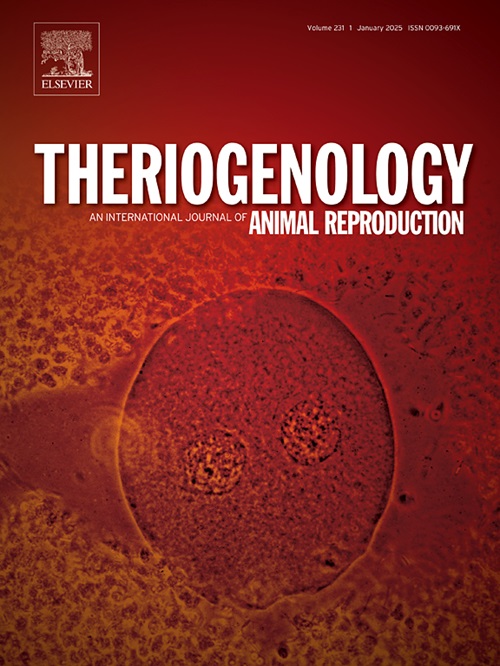Mitoquinone improves porcine embryo development through modulating oxidative stress and mitochondrial function
IF 2.4
2区 农林科学
Q3 REPRODUCTIVE BIOLOGY
引用次数: 0
Abstract
Oxidative stress caused by excess reactive oxygen species (ROS) is one of the main causes of low efficiency in in vitro production of embryos. These ROS can cause mitochondrial dysfunction and apoptosis, resulting in poor embryo development. Therefore, to prevent mitochondrial damage and apoptosis caused by ROS, we investigated the effects of mitoquinone (MitoQ), a mitochondrial-targeted antioxidant, on the in vitro culture (IVC) of porcine embryos. Various concentrations of MitoQ (0, 0.01, 0.1, or 1 nM) were supplemented during the entire period of IVC. The results showed that supplementation with 0.1 nM MitoQ significantly increased the blastocyst formation rate, with a higher total cell number including trophectoderm cell number and higher transcript expression of lineage-specific transcription factors in blastocysts. In addition, the 0.1 nM MitoQ-treated group showed a significantly lower percentage and number of apoptotic cells in blastocysts with positively regulated transcript expression of apoptosis-related genes. Therefore, 0.1 nM MitoQ was suggested as optimal concentration for porcine IVC and used for further investigations. MitoQ treatment significantly reduced intracellular ROS levels and increased glutathione levels in Day 2 embryos, with upregulated the transcript expression of antioxidant enzymes-related genes. Furthermore, the MitoQ group exhibited a significantly higher mitochondrial quantity, mitochondrial membrane potential, and ATP content in Day 2 embryos, with increased transcript expression of mitochondrial biogenesis-related genes. Taken together, these findings reveal that MitoQ supplementation can enhance the developmental competence of porcine embryos by decreasing oxidative stress and improving mitochondrial function.
线粒体醌通过调节氧化应激和线粒体功能改善猪胚胎发育。
过量活性氧(ROS)导致的氧化应激是体外生产胚胎效率低下的主要原因之一。这些 ROS 可导致线粒体功能障碍和凋亡,从而导致胚胎发育不良。因此,为了防止ROS引起的线粒体损伤和凋亡,我们研究了线粒体靶向抗氧化剂线粒醌(MitoQ)对猪胚胎体外培养(IVC)的影响。在猪胚胎体外培养的整个过程中补充了不同浓度的 MitoQ(0、0.01、0.1 或 1 nM)。结果表明,补充 0.1 nM MitoQ 能显著提高囊胚形成率,囊胚中细胞总数(包括滋养层细胞数)增加,细胞系特异性转录因子的转录表达增加。此外,0.1 nM MitoQ 处理组的囊胚中凋亡细胞的比例和数量明显降低,凋亡相关基因的转录表达呈正向调节。因此,0.1 nM MitoQ 被认为是猪 IVC 的最佳浓度,并被用于进一步研究。MitoQ处理可明显降低第2天胚胎细胞内ROS水平,提高谷胱甘肽水平,并上调抗氧化酶相关基因的转录表达。此外,MitoQ 组第 2 天胚胎的线粒体数量、线粒体膜电位和 ATP 含量明显增加,线粒体生物发生相关基因的转录表达也有所提高。综上所述,这些研究结果表明,补充 MitoQ 可以降低氧化应激,改善线粒体功能,从而提高猪胚胎的发育能力。
本文章由计算机程序翻译,如有差异,请以英文原文为准。
求助全文
约1分钟内获得全文
求助全文
来源期刊

Theriogenology
农林科学-生殖生物学
CiteScore
5.50
自引率
14.30%
发文量
387
审稿时长
72 days
期刊介绍:
Theriogenology provides an international forum for researchers, clinicians, and industry professionals in animal reproductive biology. This acclaimed journal publishes articles on a wide range of topics in reproductive and developmental biology, of domestic mammal, avian, and aquatic species as well as wild species which are the object of veterinary care in research or conservation programs.
 求助内容:
求助内容: 应助结果提醒方式:
应助结果提醒方式:


